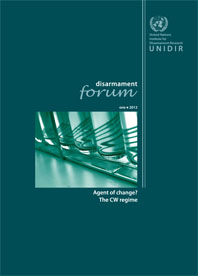The chemical weapons regime receives scant attention in comparison to those dealing with other WMD. The daily efforts of the Organisation for the Prohibition of Chemical Weapons (OPCW) are significant but occur somewhere in the background of the wider public's consciousness. And yet, the rate of scientific and technological advances mean that the CW regime is of more relevance than many people realize—and this relevance will continue to grow. The CW regime must evolve and adapt if it is to remain relevant, yet organizations and treaty regimes are not known for their capacity for rapid response. As the international community prepares for the 2013 CWC Review Conference, which approaches will offer the greatest responsiveness to new and yet imagined developments? Experts contributing to this issue, under the able Guest Editorship of Dr Alexander Kelle, address this question from a range of perspectives.
Citation: Kerstin Vignard, Alexander Kelle (eds.) (2012). "Disarmament Forum: Agent of Change? The CW Regime", UNIDIR, Geneva.
Disponible aussi en français.
Contents
- Editor’s note, Kerstin Vignard
- Special comment, Alexander Kelle
- Science and the “new” Chemical Weapons Convention: multiple roles for civil scientists?, Malcolm Dando
- Keeping the genie in the bottle: preventing the proliferation and misuse of incapacitants, Michael Crowley
- The global abolition of chemical weapons, Paul F. Walker
- The OPCW in transition: from stockpile elimination to maintaining a world free of chemical weapons, Ralf Trapp
- Non-proliferation and preventing the re-emergence of chemical weapons, Alexander Kelle
- UNIDIR focus
